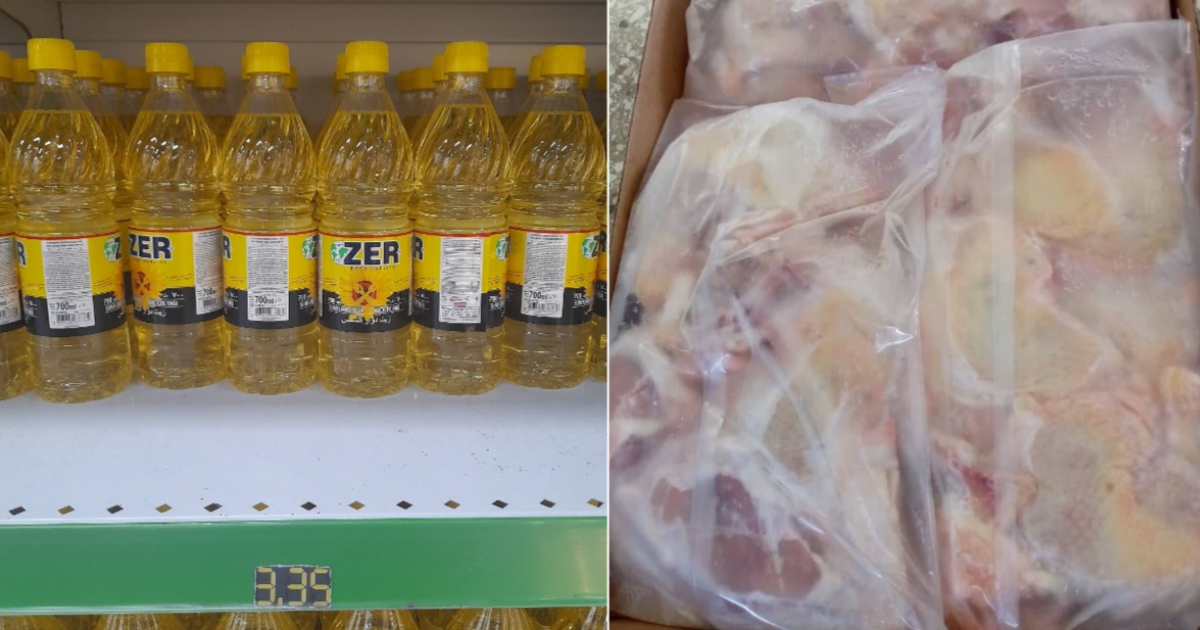The Cuban government is disregarding the price caps in its own stores that operate in Freely Convertible Currency (MLC). Many individuals are already experiencing this issue during their shopping trips and have taken to social media to report what could be a violation of the resolution in the controversial state-run foreign currency stores, especially considering the value of the MLC in the informal market.
The El Bohío Mío profile on the social network X specifically highlighted how price caps are being ignored in MLC stores with products like oil. In the Ayllón Mall in Matanzas, vegetable oil is being sold at a price higher than the newly established cap.
"They capped the price of vegetable oil for small and medium-sized enterprises (mipymes) and are selling it above that cap in MLC stores. Seen on July 9 at the Ayllón Mall in Matanzas," reads the post from El Bohío Mío.
The state set an exchange rate of 1 to 120, but it never has foreign currency to offer, forcing the population to turn to the informal market to buy dollars, euros, or MLC, which this Wednesday is valued at 295 pesos.
The regime announced on Monday the implementation of price caps on six high-demand basic products through Resolution 225/2024 from the Ministry of Finance and Prices. The products and their maximum established prices are as follows:
- Chicken pieces: 680 pesos per kilogram
- Edible oils (excluding olive oil): 990 pesos per liter
- Powdered milk: 1,675 pesos per kilogram
- Pasta: 835 pesos per kilogram
- Sausages: 1,045 pesos per kilogram
- Powder detergent: 630 pesos per kilogram
According to the resolution, the maximum price for vegetable oil is 990 Cuban pesos per liter. However, the oil being sold is in 700 ml bottles priced at 3.35 MLC. Considering the value of MLC in the informal market (295 CUP), the price of 3.35 MLC for a 700 ml bottle of oil equates to 990 pesos. The price per liter of oil would be 4.79 MLC (1,413.05 CUP), thus exceeding by more than a dollar the capped value for this product.
Oil is not the only product with pricing issues in MLC stores. There is also the case of chicken. The price per kilogram of chicken is around 820 pesos (42 MLC for a 15 kg box of chicken pieces) according to the exchange rate in MLC stores, while the cap is set at 680 Cuban pesos.
The non-compliance with the new pricing regulations by the MLC stores raises doubts about the effectiveness of the measures announced by the government. Resolution 225/2024, initially presented as a solution to protect consumers from inflation, now appears to be causing new issues such as shortages in the private sector's supply.
For years, there has been a decrease in the availability of products in state stores. The mipymes were the main source of supply for many Cubans but are now starting to stop selling basic products like milk, which is no longer available in MLC.
Some Cubans, like economist Pedro Monreal, even fear that many entrepreneurs may decide to close their businesses due to the price caps.
The reporting of the regime's irregularities in its MLC stores highlights a crisis of compliance and trust in governmental policies. The lingering question is whether the government will take measures to ensure that its own stores adhere to the established regulations and protect consumers from abusive prices.
FAQs on Cuban Government's Price Caps in MLC Stores
Below are some frequently asked questions regarding the Cuban government's price caps in MLC stores and the ongoing issues surrounding these regulations.
What are the products affected by the price caps in MLC stores?
The products affected by the price caps include chicken pieces, edible oils (excluding olive oil), powdered milk, pasta, sausages, and powder detergent. These were listed in Resolution 225/2024 by the Ministry of Finance and Prices.
How is the informal market affecting the price caps in MLC stores?
The informal market is affecting the price caps because the state does not have enough foreign currency to offer at the official exchange rate. This forces people to buy MLC at a much higher rate on the informal market, making the capped prices effectively higher than intended.
What are the consequences of non-compliance with the price caps in MLC stores?
The non-compliance leads to higher prices for consumers, shortages in product availability, and a general lack of trust in government policies. It also puts additional financial pressure on small and medium-sized enterprises (mipymes), which may decide to close their businesses.
